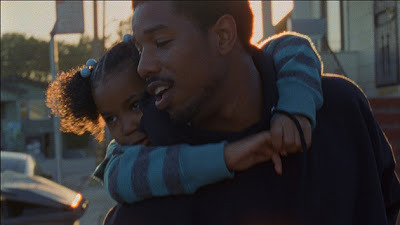Fruitvale Station: Swansong for Oscar Grant, Trayvon Martin, & the Bruhs by Stephane Dunn
 Fruitvale: Swansong for Oscar Grant, Trayvon Martin, & the Bruhs
by Stephane Dunn | special to NewBlackMan (in Exile)
Fruitvale: Swansong for Oscar Grant, Trayvon Martin, & the Bruhs
by Stephane Dunn | special to NewBlackMan (in Exile)I knew I had to see it, but to tell you the truth a part of me was not looking forward to Fruitvale Station. I’ve been avoiding writing about Trayvon Martin, wanting to get a better grip on the volcano of emotion that has enveloped me since The Verdict despite bracing myself for just that outcome. Ryan Coogler’s Fruitvale Station, coming literally on the heels of it, was bound to serve as a powerful footnote of this defining contemporary moment.
The murder of Oscar Grant is one I remember too well. Upon hearing about it on New Year’s Day 2009, I was upset, actually furious and sad, and something else kind of new. I was afraid already for my own child, my son as it turns out, who was months from being born. I couldn’t ignore the way that Grant’s death struck me four years ago. And luckily, there are two things I don’t like to miss: a rare entry in the usual overhyped, blockbuster crazy summer season and that moment when a new filmmaker bursts on the scene with a stunning debut.
Spoiler alert on my own review: At the end of Fruitvale Station, I sat there in my seat, along with several friends and family, and did not move. I sat and stared at the screen as if the last image of the film was still to come, and I was still sitting there, we all were, until the ‘All Rights Reserved 2013’ rolled across the screen. Fruitvale Station comes down to story or rather compelling storytelling; it does not skate on its heavyweight topic.
Coogler’s stylistic choices, the documentary-look, minimalist approach, the emphasis on the simplest visual details and cues – these enhance the very right choice to frame the story through the prism of a day, an ordinary one for Oscar Grant that ends extraordinarily and tragically as his last on earth. Choosing to focus on his life to suggest what of value was lost rather than say the aftermath when Oscar becomes Bay area headline news sets the tone for a well-paced narrative.
Other smart choices abound, for example, the fictionalized fill-in moments rounding out Oscar’s day like a heart wrenching gas station stop [no spoiler here], the text messages, imposed on the screen that serve to punctuate the time ticking down to midnight and the end of Oscar’s life, the strategic mix of close-up and long shots. The flashback, used sparingly, but to extraordinary effect, and especially at the end when Oscar is pronounced dead. The contradictions and challenges of the streets that Oscar struggles to navigate as he goes about being a son, lover, and the father of a little girl are treated with an edgy realism that avoids either over sentimentalizing Oscar and his world or demonizing either.
The humanization of Oscar Grant, both a gift of Coogler’s direction and Michael B. Jordan’s perfectly pitched performance as the young victim, is one of the great achievements of this difficult dramatization. Grant is neither neatly hero or anti-hero [stereotypical young black thug] but a young man who alternately has failed to make sound choices but desires to do right, to do better.
There are deceptively basic everyday moments that serve to humanize Oscar Grant and essentially many young black men beyond their criminalization – Grant’s home training [manners] and decency to others on the street and in a store, the simple play and best friends talk between a young father and the daughter he obviously adores.
We know going into the theatre how the story must end; this is not where poetic license will intrude, but still, the movement and the sound of that BART train, rushing towards Fruitvale and a fatal clash with police, and then the inevitable end for a family in a hospital waiting room is simultaneously suspenseful and heartbreaking.
Fruitvale Station is a for all audiences kind of film across race, ethnicity, and class, including police and folks who believe the hype about young black men on sight. It is the story of Oscar Grant but it’s also that of many other ‘Bruhs’ – that’s why it’s a painful watch. It bears signs of a first feature film though that too will become part of its historical charm. There is a lot more than can be said about Fruitvale Station, which makes a few missteps but offers much to interrogate about the politics of representation. But that’s for later. For now, add Ryan Coogler to an impressive group of young directors with memorable debut films.
***
Stephane Dunn, PhD is a writer and Co-Director of the Film, Television, & Emerging Media Studies program at Morehouse College. She is the author of the 2008 book, Baad Bitches & Sassy Supermamas : Black Power Action Films (U of Illinois Press), which explores the representation of race, gender, and sexuality in the Black Power and feminist influenced explosion of black action films in the early 1970s, including, Sweetback Sweetback’s Baad Assssss Song, Cleopatra Jones, and Foxy Brown. Her writings have appeared in Ms., The Chronicle of Higher Education, TheRoot.com, AJC, CNN.com, and Best African American Essays, among others. Her most recent work includes articles about contemporary black film representation and Tyler Perry films.
Published on July 29, 2013 13:52
No comments have been added yet.
Mark Anthony Neal's Blog
- Mark Anthony Neal's profile
- 30 followers
Mark Anthony Neal isn't a Goodreads Author
(yet),
but they
do have a blog,
so here are some recent posts imported from
their feed.



